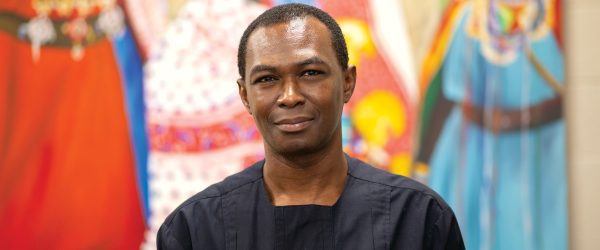CLAS faculty member named a Chancellor’s Professor

Akinwumi Ogundiran, a transdisciplinary scholar and professor in the departments of Africana Studies, Anthropology and History, is now a Chancellor’s Professor at UNC Charlotte. This campus honor recognizes his outstanding scholarly achievements and demonstrated excellence in interdisciplinary research, teaching and service.
“Dr. Ogundiran is an internationally recognized scholar whose contributions to the University and to the highly interdisciplinary fields of Africana studies, anthropology, history and the arts define what it means to be a Chancellor’s Professor,” said Joan Lorden, provost and vice chancellor for Academic Affairs. Ogundiran is only the third scholar at UNC Charlotte to receive this honor since its inception in 2013.
Ogundiran is editor-in-chief of the African Archaeological Review and has served on the editorial boards of 10 academic journals and three monograph series. He is active in the African Studies Association, the leading North America-based interdisciplinary organization for scholars of Africa, where he serves on the editorial board of its flagship journal, the African Studies Review, and has sat on the Distinguished Africanist Award Selection Committee.
Contributing to scholarship across a range of disciplines, Ogundiran has published one peer-reviewed book, four edited volumes, two short monographs and 35 peer-reviewed journal articles and book chapters, in addition to numerous book reviews, research notes and essays. His most recent co-edited volume, “Materialities of Ritual in the Black Atlantic,” was recognized as a Choice Outstanding Academic Title.
“The impact of Professor Ogundiran’s research stems from the themes of human society and behavior that he explores through archaeology, history and geography. These characteristics make Professor Ogundiran’s research truly transcendent, not just across academic disciplines, but also through the entire human experience,” said Nancy Gutierrez, dean of UNC Charlotte’s College of Liberal Arts & Sciences (CLAS).
Highly prestigious funding organizations, crossing the humanities and social sciences, have supported Ogundiran’s research. They include the National Humanities Center, Carnegie Foundation, Dumbarton Oaks, Social Science Research Council, Wenner-Gren Foundation for Anthropological Research, National Endowment for the Humanities, Boston Humanities Foundation, American Philosophical Society and National Science Foundation-supported programs, among others.
Ogundiran said, “Human desires and aspirations are the same; it is the ways in which we fulfill them that differ across time and space. This is the reason why many of the challenges that we face today were the very same concerns that preoccupied the ancient communities that I study in West Africa: social inequality, equitable access to resources, environmental degradation, social difference, migration and diversity, and consequences of globalization. The success and failure, fragility and resilience and the experience and knowledge systems of those African communities provide unique insights and fodder for deep-time thinking into how we may address some of the challenges of sustainable social reproduction that confront us today.”
Through his research, Ogundiran has established a global reputation and has been invited to present at prestigious universities around the world, including the University of Cambridge (United Kingdom), University of Ibadan (Nigeria), University of the Witwatersrand (South Africa), Columbia University, the University of Texas at Austin and the University of Wisconsin.
From 2008-18, Ogundiran chaired UNC Charlotte’s Department of Africana Studies, and during this time it transformed from a U.S.-centric focus to encompass a global examination of the African diaspora. The department has emerged as a leader in Africana scholarship, even as the discipline has expanded its influence nationally.
“Africanist scholarship continues to examine past legacies and future challenges throughout Africa and the African diaspora, but now extends to the significance of these legacies and challenges for a global understanding of what it means to be human,” Gutierrez said.
During Ogundiran’s time as department chair, he partnered with the College of Arts + Architecture to launch an Artist-in-Residence program, initiated the annual Dr. Bertha Maxwell Roddey Distinguished Africana Lecture and established the Africana-in-Schools Program. He also strengthened community connections, such as with the Harvey B. Gantt Center for African-American Arts & Culture.
Additionally, he launched a series of curriculum reforms, including the Africana Studies Honors Program, an undergraduate concentration in Health and the Environment that includes courses from the College of Health and Human Services and a Graduate Certificate in Africana Studies that includes courses from the Cato College of Education.
The Department of Africana Studies, under Ogundiran’s leadership, was recognized in 2016 for its outstanding achievements in curriculum innovations, research, and community engagement with the Sankore Institutional Award from the National Council for Black Studies.